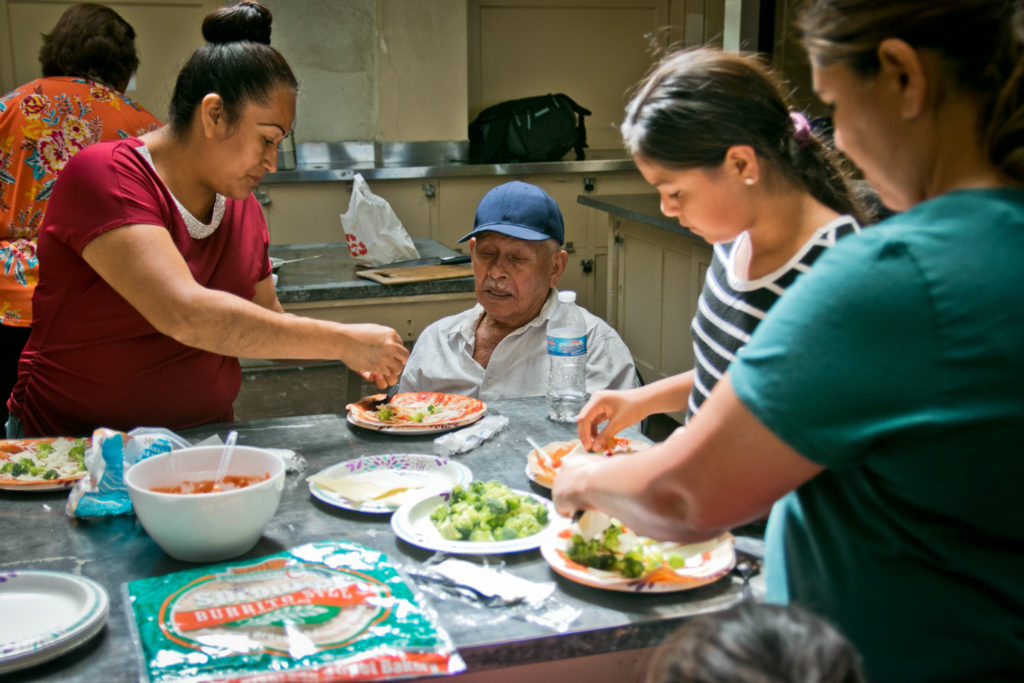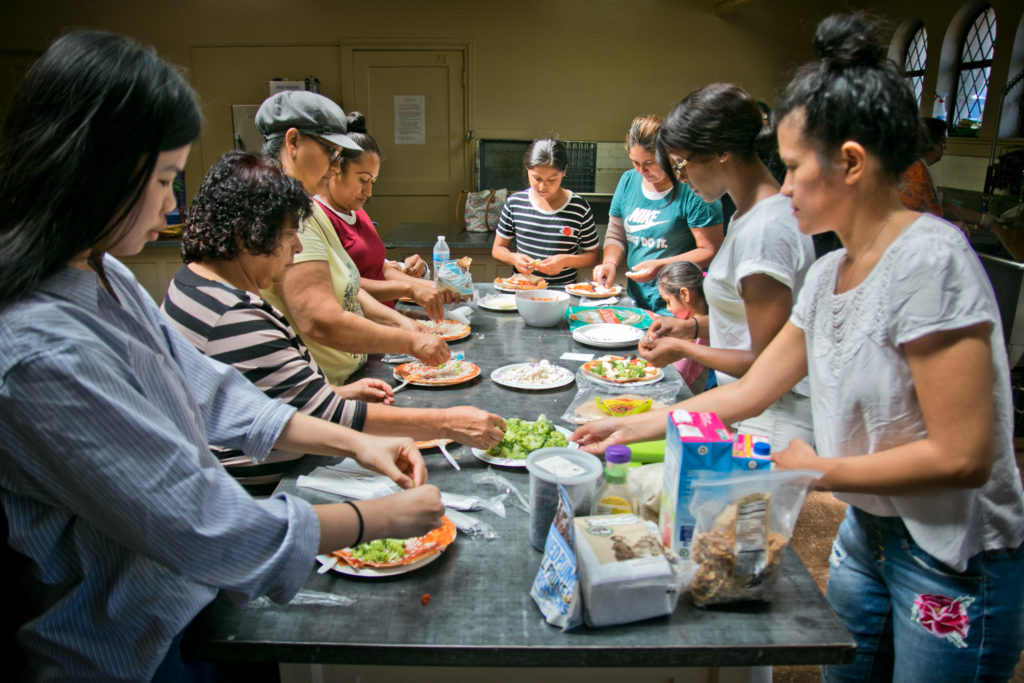Late last month, a handful of new student volunteers met at the corner of 78th Avenue and Spencer Street for a canvassing session. They shadowed volunteers from the Coalition of Concerned Medical Professionals (CCMP), an all-volunteer effort to “overcome political and economic barriers that deny access to comprehensive medical care,” as their mission states.
These students were joined by members of another community organization, the Western Service Workers Association (WSWA). Together, they passed from house to house in groups of two to five, alternating between English and Spanish according to each resident’s needs and speaking on the subject of community and healthcare.
Both CCMP and WSWA often work in close conjunction with one another to canvass and connect healthcare and wellness resources with those that need them the most. Namely, they include Bay Area residents who are denied coverage by insurance companies, or who don’t qualify for Medi-Cal because of income thresholds.
According to the Department of Health Care Services, an individual person must make under $1,366 monthly to qualify for benefits. For two people, that number is $1,842. Meanwhile, a two-bedroom apartment in Oakland costs around $2,329 per month, according to the National Low Income Housing Coalition study Out of Reach. To fall into the category of those who are forced to choose between housing, food, utilities or healthcare is easy. On these canvasses, CCMP and WSWA not only find benefit recipients but sometimes succeed in recruiting more volunteers.
“My uncle is poor,” UC Berkeley student, Zoey Caw, said of her reasons for becoming a CCMP volunteer. “When he had liver cancer they said he was making too much to clear the threshold, but he couldn’t afford treatment. So that’s why I’m here.”
Established in the Bay Area in 1976, the CCMP reached its first milestone during the immunization fight from 1979 to 1982. According to CCMP’s orientation outline, its volunteers then successfully collaborated to defeat caps in the ’80s and ’90s; caps which would have placed restrictions on the number of healthcare resources distributed to the blue-collar class. Its volunteer body has included unrecognized and manual laborers, independent contractors, nurses, doctors, chefs, domestic workers, small-business owners and students from local schools.
“The word I guess I’m looking for here is disillusionment. I’m here because the resources exist, but there are so many walls,” Luz Mejia-Mass, a CCMP volunteer, said. “Contractors just pocket the money, and then barriers prevent those who qualify for Medi-Cal from getting their benefits.”

In 1965, Title XIX of the Social Security Act was authorized and signed into law by President Lyndon B. Johnson, guaranteeing Medicare for the elderly and Medicaid for the poor and disabled. Over the course of the next few decades, the ideal of a federally-run program eroded. Under President Richard Nixon, the Health Maintenance Organization Act of 1973 promoted the expansion of managed care by private insurers. Years later, under President George W. Bush, the Medicare Prescription Drug Act of 2003 functioned as a “Trojan horse,” covering prescription drugs yet also restricting the government’s ability to negotiate prices with private corporations.
Even under alleged progressives such as President Bill Clinton, Section 1115 Waivers were instituted, allowing states to sidestep federal restrictions and institute their own programs. Under these waivers, Medicaid and Medicare were contracted out to private companies, further promoting so-called managed care. Although intended to control prices, managed care has, in the opinion of many volunteers at CCMP, primarily benefitted insurance companies over benefit recipients. Young volunteers such as Mejia-Mass and Caw have both been personally impacted by policies such as these.
According to an article written by Chad Terhune and published in Kaiser Health News and the Los Angeles Times, Medicaid insurers in the state of California “made $5.4 billion in profits from 2014 to 2016,” and in 2016 made more profits than “all Medicaid insurers combined in 34 other states with managed care plans.”
Since 1976, CCMP has actively battled against privatized profits from publicly funded Medi-Cal programs. Due to this activity and a matter of policy, CCMP remains independent from government funding. Since it seeks to change government policy and systems, it cannot qualify as a 501(c)(3).
“We don’t have a healthcare system. We have a disease-management industry,” Olivia Rodriguez, registered nurse and operations manager at CCMP, said. “All these people, they have a doctor, but they get fifteen minutes and it takes them months to get an appointment, or they don’t get an education. That’s why CCMP’s mission is preventative healthcare. That’s the thing that people need, but it doesn’t make profits.”
These concerns prompted Rodriguez to leave the corporate healthcare industry and join CCMP.
“All the reasons I got into nursing, I couldn’t fulfill in a for-profit healthcare system,” Rodriguez said. “And I saw that I could do it better outside of that system.”
CCMP provides services and resources outside of that system-—free of charge—that includes medical advocacy, referrals, supplemental nutrition, non-emergency dental and optical care, health education and general medical sessions.
For instance, On Sept. 21, CCMP and WSWA hosted an educational session on food and nutrition in the basement of the First Congregational Church of Oakland. A week later, CCMP hosted another session—this time on heart disease.

For those left behind by the Medi-Cal system, transportation and education about food tend to be the largest barriers to good health.
“Almost everyone had medical coverage, everyone had a doctor, but everyone had high blood pressure,” Rodriguez said. “High blood pressure is not a normal occurrence. It is a pathogenic occurrence. It will cause organ damage.”
These sessions, Rodriguez explained, are a key part of the preventative plan.
“We are teaching people to take back what is rightfully theirs. People have the right to nutritious food. People have the right to know what is and isn’t healthy, and they have the right to eat well.”
In addition to these educational sessions, Rodriguez is also working to grow CCMP’s general medical sessions. Each session typically begins with a treatment plan from a doctor, with volunteers then figuring out how to carry out the plan, whether by connecting the benefit recipient with treatment or by taking advantage of existing government programs. Each volunteer gains on-the-job advocacy experience, organization skills and learns to work with and around a difficult healthcare system. Procedures, lab work and medications are for the most part donated by individual doctors and pharmacies.
“What we need the most right now are people to help build change,” Rodriguez said. “We need to unite every sector of the population. We need people who are disgusted, people who are dissatisfied, people who are sick and tired of being sick and tired.”
For more information about CCMP, visit https://www.ccmpbayarea.com. To volunteer, contact 510-436-8020.
